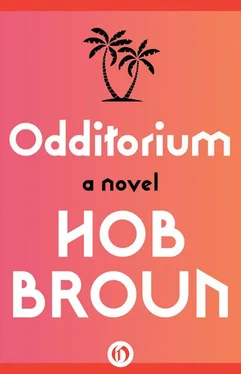“They told me, ‘down in the leaves.’ No point messin’ in there.” He threw the stick into the black mouth of the doorway. “Somewhere under us,” and he put his ear to the ground.
Tildy shivered and buttoned up her sweater. This would be a vigil. She had turned away; Karl’s arms curled around her from behind, his nose cold on the back of her neck.
“Don’t be mad with me, baby. You’ll see.”
He clapped on the earphones, fiddled briefly with the tuning and volume controls, and began a preliminary sweep with his metal detector. Ten feet from the porch, beeps came loud and fast. He made a few circles of the area, homing in on where the signal was loudest, then took up the smaller shovel and began digging. Minutes later, he pulled out the bottom part of a kerosene lamp; an earthworm hung from its rust-chewed edge.
“At least you know the machine’s working right,” Tildy said helpfully.
But two hours later her supply of comforting words was running low. There were holes in front of the house, in back of the house, along the sides. Karl had worked painstakingly at first, scooping out round, smooth-edged cavities and mounding dirt neatly to one side, but the last ragged few looked like shell craters with dirt flung in all directions. The booty so far included a screwdriver, two spoons, a paint can and a faucet. The chill had settled in for the day, but Karl was perspiring heavily and had peeled down to his undershirt.
“In the leaves,” he muttered.
She could not bring herself to look at him.
He stood with one foot resting on the edge of the porch, leaning over with his chest supported on the bent knee. “The man that won’t be beaten can’t be beaten.” He was gasping for air. “And I won’t. No, I won’t.”
Karl sprang onto the porch, took one step toward that yawning door and his foot crashed through rotten wood. Foundering, he landed on his side, twisted, and splinter-teeth gouged his ankle. Tildy rushed to him, but he diverted her with a ferocious snarl, and turning very slowly lifted the foot free. Red blood seeped through a torn white sock, and lodged by its stem under crisscrossed shoelaces, a thin round of dead brown — a leaf.
Karl pitched his head back and yodeled with joy. “See that? I’m right on top of it.”
“What? What?”
“There’s a leaf on my shoe.” Reaching for it with quivering fingers, “Lord, I’m gonna kiss this leaf.”
And so he did, with the hungry gratitude of a man saved from drowning. Then he reached into the hole his foot had made and tossed up a great profusion of leaves that sailed and propellered down the air to land all around him like banknotes at the climax of a crime film.
“Down in the leaves, boys, I hear you now. We red-hot, boys. We got the goods.”
Tildy was frightened by the passion in his voice.
“Get the crowbar. Bring them things over here and we’ll rip this porch right up till we find what’s underneath.”
Raving. Delirious. He was like a man who’d been chasing a mirage across the desert for too long. She wanted to blanket him with her body, cover his parched mouth and burning eyes and lure him into sleep. But it was much too late for that. So she worked alongside him, trying not to think of anything but the cadence of her pickaxe swings. Steady as a metronome. Wood breaking apart, flying. Ground opening up to light it hadn’t seen in years … Clang . Pick point hitting something that was also metal. A shorter stroke, another clang. She reached down and felt smooth cold sides meeting in a rounded edge, little knobs up and down. She flopped on her stomach and peered down. It was a steamer trunk.
“Karl,” she said with cobwebs on her face. “Over here, Karl.”
He kissed her hands once he’d looked, very calm now, balanced. “You did it, babe. My good-luck charm, like always.”
They levered and lifted and heaved and there it was, a simple box reinforced with studded iron strips, scraps of railway and hotel decals grafted to its filthy skin. They stood looking at it, at each other, for a long time.
“Ready?”
As Karl worked the crowbar under the lock, Tildy thought: Maybe it’s just another body. Trunk murder. He wiped his hands, hesitated slyly and lifted the lid. The money was not neatly bundled but lay there in a frozen whirlpool of fives and tens and twenties.
“I love you,” and she held him tight.
It was not the sight of money that caused this welling up but a vast relief. He was not lost to her after all. Victory instead of lunacy. Karl had won.
“Let’s see what else we got.”
He went to his knees and pushed through the layer of paper. The first coffee can he opened was stuffed with gold turnip watches.
In the days that followed Karl found it hard to sleep. There were dark raccoon circles around his eyes. He floated through the house in a glowing envelope of bliss, the only nourishment he needed. He played on the floor like a child with the rings and stickpins, the gold coins and gold toothpicks and gold cigar cutters. He picked necklaces for Tildy like wildflowers, topaz and emerald and sapphire. A strange reserve played across his face. It was as if he had popped through a celestial warp into another dimension and nothing, not even the news of Lester Clines’s jailhouse suicide, could touch him. He was happy just to play, but Tildy couldn’t be so just watching.
Her initial elation had worn off; the impact of their discovery had left bruises. But she breezed off to work each morning, spent the day making change, helping ladies decide which pair of cheap earrings to buy; and the absurdity of the situation offered no comfort. While Karl was on a bender, reeling with visions of a new life that changed hourly, she saw only how much coping she’d have to do; she saw that this sudden blessing of theirs could just as easily be a curse, a machine to manufacture worries. Sooner rather than later, Karl would want to broadcast news of their discovery all over town — she worried about that. True, Lester Clines had discouraged further investigation by hanging himself with his own trousers, but still they were holding evidence in a murder case — she worried about that. They were holding a few thousand in cash and an array of nonnegotiable but traceable items that would have to be fenced somehow — she worried about that, too.
“It’s too much for me to handle. I’m afraid.”
Tildy repeated and repeated these words like a mantra in the vain hope that an admission of fear would in some way strengthen her. “I’m afraid,” she would whisper, to which her only response was, “Yes, you certainly are.”
“Let’s buy a boat and sail around the world,” Karl said to her one afternoon as she arrived home early from the Medi Quik. “Let’s buy a farm and raise racehorses.”
Tildy scooped up the cufflinks he’d been sorting through and shook them in his face. “You can’t buy anything with this, it’s not money. Do you understand me? That’s not a treasure chest we’ve got, it’s a toy chest. So play with your fucking toys and leave me alone.”
She went into the bedroom and slammed the door. All Tildy had in mind was stashing herself in that little box of a room and shutting down her tired brain. But she was about to uncover one more false theory, about to prove that desperation, not necessity, was the mother of invention. She pulled off her shoes, flung them one after the other at the back of the closet; and she thought of Sparn.
Sparn the fixer, the Big Peter who could always get into dark and unseen places. He knew all the angles and how to play them. He knew all the pipelines, where they began and where they emptied. She needed outside help to turn toys into money and he could give it. Sparn was a businessman first and always, and last year’s grievances wouldn’t count for much if she could bring him a deal.
Читать дальше












